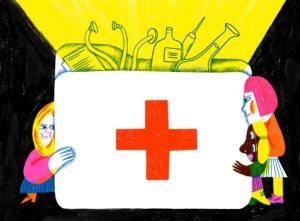
Shut Up Claudia
Description
Mobility for Africa (MFA) operates out of Zimbabwe and provides environmentally sustainable mobility services for rural communities, particularly women. MFA locally assembles custom-built electric tricycles that run on li-ion battery packs, powered through solar-charging stations. These electric tricycles are aimed at all sectors of the community, including small scale farmers and women’s organisations. The tricycles have been particularly impactful when used by healthcare workers, where they have enabled improved access to health services.
Context
In rural Africa, there is a big obstacle. Millions of people don’t have access to reliable, safe, and efficient last-mile mobility solutions. For rural women, the impact is particularly dire: long hours are spent carrying heavy loads to market and crops rot before they make it there, children drop out of school because the walk is too far, and economic opportunities are missed due to the considerable distances from resources. While roads are essential, communities need transport that is affordable, efficient, and adapted to peri-urban and rural areas of Africa.
The challenges are particularly acute in the health care sector. In rural Zimbabwe, lack of accessible, appropriate and affordable transport for both service providers and users reduces access to timely and quality health services. Mortality in children under 5 is 15% higher in rural areas in Zimbabwe compared to urban areas, and significantly more women in rural areas give birth outside of health facilities and without a skilled birth attendant.
Existing transport options for health workers such as bicycles, motorbikes, cars and SUVs are not fit for purpose. Designs of these transport options are tailored to men and exclude women, which is a critical issue given that about 80% of primary health care workers in Zimbabwe are female. These urban transport solutions are also often not suitable for the poor terrain and off-road conditions of rural settings. Second-hand cars and SUVs are costly economically (purchasing and operating) and rely on fuel, which can often be hard to access in Zimbabwe. Finally, bicycles and motorcycles also have limited ability to carry cargo, which does not allow for their use in transporting less mobile patients to health facilities or bringing medical supplies to the community.
Technical details & Operations
Mobility for Africa’s electric tricycles are built specifically for use in rural settings. They have a large wheel size, tread and suspension that allows them to cope with tough off-road conditions. The design is inspired by women, for women: the bench seat means that no straddling is required. With a 20 km/hr top speed, it has low regulatory requirements. The tricycles don’t require any prior experience or licence to operate and someone can learn to drive them in just days. The tricycles have a carrying capacity of 400 kg and a range of 100 km on a single charge, making them highly functional especially for use in the health sector. Dedicated, trained technicians are located in each community to service and maintain the vehicles.
The electric tricycles are powered by a tailor-made 48V Li-ion battery. In each community using the tricycles, MFA inputs a purpose-built solar charging station central to the fleet to enable battery swapping and continual tricycle use. Through Zimbabwe’s Solar for Health initiative (led by the Ministry of Health and Child Care and the United Nations Development Programme), 57% of health facilities now have solar infrastructure. Thus, these health facilities already have the ability to use the solar energy they collect to charge MFA’s electric tricycles for use by their health workers.
MFA introduces its tricycles into communities through shared-scheme models to encourage innovative intra-community collaborations, diversify income streams, and make transport economically viable. A range of business models is used to cater to different members of the community from rental for small scale farmers, to commission for transport and logistics drivers to subsidised lease-to-purchase for service delivery users. These are all aided by blended use of public and private finance.
Deployment & Impact
Over 100 MFA tricycles have been introduced across three pilot communities in Zimbabwe: Wedza, Dombashawa, and Chipinge. These pilots have demonstrated proof of concept for MFA’s multi-sectoral approach to strengthening rural communities in Africa. The impact extends across many of the Sustainable Development Goals (SDG), for example:
SDG 1: No Poverty – MFA’s solution has helped to raise income levels by offering mobility to enable economic practices, e.g. farming, buying, and selling. In Wedza, increased income has affected the lives of over 1,300 rural people since 2019.
SDG 2: Zero Hunger – Before the tricycle was introduced in Wedza, small-scale horticulturalists said they often would leave much of their produce at home, unable to transport it to market. By using the tricycle, some of the small-scale horticulturalists have almost tripled their production.
SDG 5: Gender Equality – in Wedza, 172 women have been trained to drive the tricycle, improving their daily livelihoods. Some have found new employment as transport and logistics drivers.
SDG 7: Affordable and Clean Energy – with electric vehicles and charging stations powered by solar (e.g., 40 panel, 15 kW solar charging station installed in Wedza), MFA is pushing the barrier of clean energy and offering alternatives to expensive fossil fuel.
SDG 8: Decent Work and Economic Growth – MFA is directly employing local staff and enabling employment for local entrepreneurs. To support the pilot in Wedza, MFA has employed 15 local staff and enabled employment for 63 local entrepreneurs.
SDG 10: Reduced Inequalities – by increasing mobility and access to markets, networks and services, MFA helps to improve quality of life and productivity in rural communities decreasing the urban/rural divide.
SDG 13: Climate Action – in Wedza, use of MFA’s tricycles have avoided an estimated 2 tons of CO2 emissions per year
In addition, the tricycles have had a significant impact on health outcomes and contribution to SDG 3 – Good Health and Well Being. At the Igava health centre in the Wedza site, clinic staff and community health workers are using the tricycles to aid their daily work. Health workers have reported an increase in their productivity. For example, clinic staff can complete immunisation outreach sessions across all communities in 2 days instead of 8 and village health workers can transport up to 5 sick patients to the facility each day instead of accompanying just 1-2 by foot.
Use of the tricycles has led to more equitable access to health care for distant and less mobile populations. For example, clinic staff can now easily reach villages over 20 km away and village health workers transport 4 to 5 pregnant women to the facility per month for delivery. Overall, health workers are able to provide more responsive and people-centred services. By delivering medication to HIV patients in their homes, village health workers help patients avoid stigma and lost work and default rates have dropped by about 50%. Finally, health workers report improved motivation and satisfaction after using the tricycles, which is especially important in the context of an under-resourced health system.





